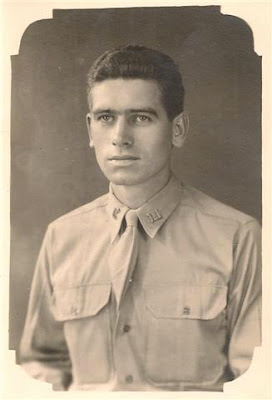My father on leave in Recife, Brazil, 1943, had this studio photograph taken for his mother and father.
I have been having a conversation--by email--with a young man from Brazil, who is writing a book about his country's role in aiding the Allied victory in World War II. President Roosevelt called it the Good Neighbor Policy, and it was of enormous help to the U.S. in many ways.
The writer found my website about the U.S Army Corps of Engineers who built Wideawake Field on Ascension Island, and, since Ascension is in the Atlantic, about midway between West Africa and Brazil's state of Natal, he wrote to ask if my engineer father had any experiences in Brazil.
I remembered my father told us that in 1943, after almost a year on Ascension, he got a pass to go to Recife, Brazil on leave. He recalled the trolley cars there and how, at one point, all the passengers had to get out and push one after it had a collision with a car. He told us the name of the Army Air Corps Club where he stayed was called "Casa Verde," which of course means Green House.
The Army painted everything Army Green!
After my father died, I found a photo of him in which he looked very young and seemed to have an awful lot of hair--for a GI. When I took the photo from the album and looked on the back I saw he had written: "Dear Mother; This photo was taken in a studio in Recife. I do not really like the way the barber combed my hair. Love, Ashley."
So, I told my new writer friend in Brazil about the photo and sent him a digital file of it with my father's comments. He apologized for his English, which I told him was enormously better than my Portuguese (which is non-existent) then he wrote me this about my father's photo:
"I showed a photo of your father you sent me for my father. My father is 78 years old. He told me that this kind of haircut was known as 'Praieiro.' 'Praieiro', a word that is translated into English means 'people of the beach.' That means that the user would normally be a man of the sea, a fisherman, a sailor. It was the kind of haircut popular with Brazilian women of the time. It showed a man with a lot of masculinity. Well, other lands and other cultures and his father probably did not know anything. Today this type of haircut is no longer used. Very interesting. Thank you."
When I wrote back about the Casa Verde, he wrote again, telling me he had a friend who was looking into where that building might be. But he was still feeling apologetic about my father's haircut, which wasn't necessary, since this haircut was well before my own time; since I think my father looks very handsome in it; and, since it was cut this way almost 70 years ago and that is now, one might say, a lot of trimmed hair under the barber chair.
"Mrs. Robin: What happened to the hair of his father was due to lack of competent professionals in many sectors, inclusive among barbers. In fact, for a young American was in the northeast of Brazil, was very different from Alabama."
As my father would put it, in his Alabama twang: "Yer darned tootin'."
(I have more serious news to share about all this, including a report the Brazilian writer uncovered of a heartbreaking wartime search for a B-25C that was scheduled to land at Wideawake Field. And I will soon fill you in on the latest on my father's papers, which have now been catalogued by the Ascension Island Heritage Society.)
But, isn't it a joy to know this terrible war brought a friendship between Brazil and America and gave the people of these two great nations a chance to meet? Who could know that many years on, my father's experience would lead to an email conversation with a Brazilian writer?
The people of Brazil were wonderful to him, he often told us, and the girls very beautiful and proper.
He would be abashed that he ever mentioned that haircut.
Subscribe to Robin Chapman News
Ascension Island Wideawakes


3 comments:
It's a pretty nice haircut, really; maybe a tad long by military standards... Makes him look like a native Brazilian.
Perhaps it helped him with the young ladies in Recife? However: he did escape to return later to America and meet my mother. She made him keep his hair very short.
I'll bet he was quite popular with the ladies there. Good call by Mom.
Post a Comment